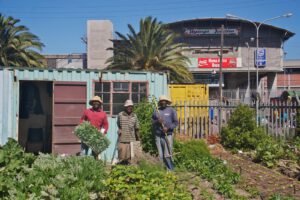Resilient Governance Regimes That Support Urban Agriculture in Sub-Saharan Cities: Learning From Local Challenges

In Sub-Saharan Africa, urban agriculture is a common practice and a valuable strategy for achieving greater self-sufficiency, improving food security, diversifying livelihoods, and increasing cities’ overall resilience against systemic shocks such as climate change and the current Covid-19 pandemic. In order to shed more light on this, PlanAdapt’s members Mariana Vidal Merino, Sumetee Pahwa Gajjar, Aasha Subedi, Ana Polgar and Catherine Van Den Hoof investigate the following question:
How do different governance structures in Sub-Saharan African cities shape urban agriculture?
In this new publication, we explore governance factors that frame the implementation of urban agriculture by looking at case studies from three Sub-Saharan African cities. Our three case cities of Kampala, Tamale and Cape Town reveal that urban agriculture is beginning to receive policy attention toward food security, and recognition for generating environmental, ecological, health, and human well-being benefits, across national and local scales.
However, local governments in Sub-Saharan Africa face the daunting task of high urban growth and food insecurity, alongside potentially devastating impacts of climate change across local communities and the economy. The recently released Working Group I’s contribution to the Sixth Assessment Report of the IPCC establishes beyond doubt, that human-induced climate change will result in increased warming, heatwaves, flooding events and droughts, as natural buffers of climate change, our oceans, forests and soils have reached their absorptive capacity. Invariably, the secondary impacts of climate change will affect vulnerable communities on the frontlines, eroding resilience across urban and non-urban landscapes.
Literature from specific cities does not yet signal a local awareness and policy thrust regarding the associated and pertinent climate adaptation benefits of urban agriculture. Urban and peri-urban food production hold potential as nature-based strategies planned for improving urban food security, reducing emissions, and climate adaptation. Co-operative governance, strategic planning, and accountable institutions are needed to support urban agriculture, in the face of climate risks, unplanned urban development, the gendered nature of food provision, and the inability of urban farmers to self-organize toward optimal market and land access outcomes.
We, therefore, recommend trans-disciplinary, locally-led, planning-based, and multi-sectoral approaches, involving a range of stakeholders toward recognizing and achieving the climate adaptation, environmental (ecologically restorative) and food security benefits of pursuing urban agriculture. This signals a larger role for the practice of urban agriculture in sustainability discourse and SDGs 2 and 11, scaling out and up across large, medium and small towns, and cities of Sub-Saharan Africa.
Download the full publication here.
